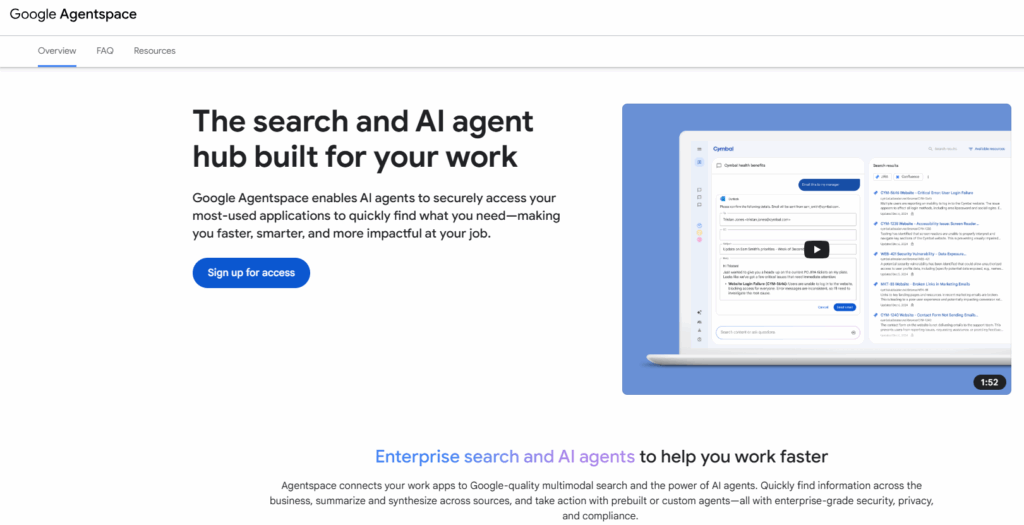At its 2025 Cloud Next event, Google made its clearest move yet to lead the next era of AI.
This wasn’t a series of feature updates. It was a comprehensive strategy to put AI agents at the centre of marketing operations. These agents are not simple chatbots or automation scripts. They are intelligent systems capable of reasoning, planning and acting independently across business-critical workflows. For marketing leaders, this represents a new layer of capability that can transform how teams generate insights, drive creativity and deliver outcomes.
Google’s AI agent ecosystem now includes everything from infrastructure and open-source tools for developers to intuitive no-code environments for business users. The opportunity is clear: marketers can accelerate planning, ideation, and execution with AI-powered collaborators that understand and act on enterprise data.
The Agentic Era: From Reactive Tools to Proactive Intelligence
The agentic era of AI refers to the rise of systems that can carry out complex tasks with autonomy. These agents are designed not just to follow instructions, but to make decisions, communicate with other systems and adapt to changing contexts. Unlike traditional automation that runs predefined scripts, agentic AI is goal-oriented and capable of continuous improvement.
For CMOs, this means access to intelligent agents that can generate ideas, test strategies, analyse performance and help shape data-driven campaigns. Tasks that once took hours or days can now be handled in minutes, and executed at scale. The marketing team is no longer limited by capacity or systems integration challenges. Agents can handle the legwork, allowing people to focus on strategy and creative direction.
Gemini: The Multimodal Intelligence Behind Google’s AI Strategy
Gemini is the foundation of Google’s AI agent framework. Developed by DeepMind, it is designed to handle text, images, video, audio and code in a unified way. The newest release, Gemini 2.5 Pro, improves reasoning and long-context understanding, which is essential for research-heavy, content-rich marketing work.
Gemini is already integrated across products such as Google Workspace and Vertex AI. That means teams can start leveraging its capabilities today, whether they are writing content, analysing campaign performance or building marketing dashboards powered by AI.
Agentspace: Where Marketing Meets Actionable Intelligence
Agentspace is Google’s enterprise platform for deploying and managing AI agents. Built for business users, not just developers, it provides a central interface to search, analyse and act on data across systems like Google Workspace, Salesforce and ServiceNow.
From the search bar in Chrome, marketing teams can now access a unified knowledge graph that understands context, intent and relationships across enterprise content. This removes the need to jump between apps or dig through folders, making it faster to find what you need and act on it.
Agentspace also includes expert agents that handle specific marketing functions. The Deep Research Agent compiles information across internal and external sources into clear summaries, while the Idea Generation Agent supports creative brainstorming by proposing and evaluating new ideas. These agents are already being used by companies such as KPMG, Wells Fargo and Gordon Food Service to speed up insights and campaign development.
No-Code Agent Tools: Fast Deployment for Non-Technical Teams
To accelerate adoption, Google has introduced two features that make it easy for marketing teams to get started with agents. The Agent Gallery provides a central hub to find, explore and activate ready-made agents developed by Google or trusted partners. These agents can be deployed directly into team workflows with minimal setup.
The Agent Designer allows non-technical users to build their own agents using a simple visual interface. For marketers, this means you can create agents that connect to campaign data, monitor audience sentiment, or automate regular reports without writing a single line of code. More advanced users can still use Vertex AI to build custom agents, which can then be published to Agentspace.
Security, Governance and Enterprise-Readiness Built In
As agents access sensitive data and connect across business systems, enterprise-grade security is essential. Agentspace provides role-based access controls, encryption with customer-managed keys and data residency options. Administrators can scan systems for sensitive data such as PII or confidential campaign assets, and block agents from accessing them as needed.
All of this is built on Google Cloud’s infrastructure, which is already trusted by thousands of enterprises globally.
Why Now Is the Time for CMOs to Lead
Google’s agent-first strategy reflects a fundamental shift in how businesses will use AI. Rather than focusing on individual tasks, the new model is built around intelligent systems that can work across departments, processes and data sources.
For CMOs, this is a chance to lead the organisation into the agentic era. By adopting AI agents, marketing teams can become more agile, more data-informed and more creative. Repetitive manual work can be automated. Insights can be surfaced faster. Campaigns can move from idea to execution in a fraction of the time.
The technology is ready. The infrastructure is in place. What’s needed now is leadership.




RECOMMENDED FOR YOU
Google Rebuilds Checkout For AI Shopping
Agentic shopping has moved from theory to reality, and…
Agentic shopping has moved from theory to reality, and…
Google AI To Power Apple’s Siri
Apple has officially teamed up with Google in a…
Apple has officially teamed up with Google in a…
Google’s Nano Banana AI App Fuels Growth
Google’s latest AI success story is not a productivity…
Google’s latest AI success story is not a productivity…